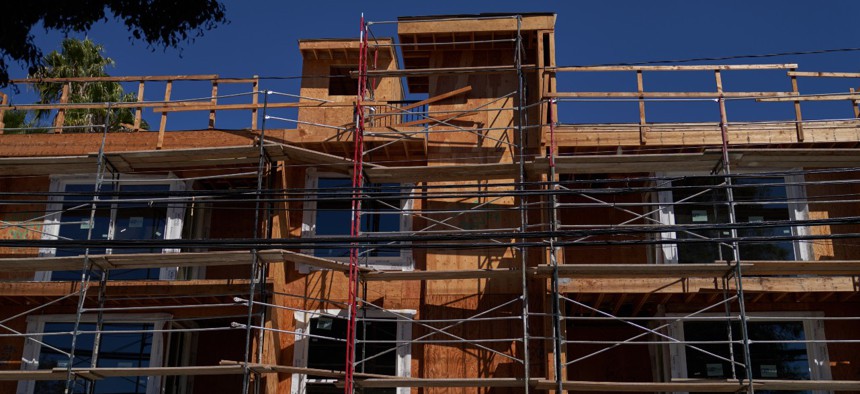‘Catastrophic Financially.’ What It Means for Cities If the Debt Ceiling Isn’t Raised

Allison Dinner via Getty Images
A default on the federal level could discourage investors from providing the money cities need to function, build affordable housing, fix roads and make other improvements.
In rapidly growing Clearfield City, Utah, Mayor Mark Shepherd is watching the drama in Washington over raising the debt ceiling, worrying about what the federal government defaulting on its loans would mean for his city’s overhaul.
In just the last four years, the city has permitted or started construction on an additional 4,000 homes after getting rid of its limit on building heights. It used municipal bonds to expand the city’s train station and raise money for other projects like fixing its roads.
But Washington’s stalemate could put a halt to more projects or force the city to raise taxes on citizens who could be dealing with a nationwide financial crisis.
The Congressional Budget Office last week said the country will run out of cash between July and September, but Shepherd is still holding out hope the Biden administration and Senate Democrats will be able to reach a deal with House Republicans to raise the debt limit to avoid the nation defaulting.
A default on the federal level could discourage investors from providing the money cities around the country need to be able to make improvements, said Shepherd, chairman of the National League of Cities’ finance, administration and intergovernmental relations federal advocacy committee.
If the federal government fails to raise the limit, it could lead to higher borrowing costs for cities and force them to direct what little money they do have to cover their debts, according to a recent article on NLC’s website. Or a congressional deal with significant spending cuts could leave gaps in education, health care and infrastructure funds.
“That's scary from a municipal level,” Shepherd said. “Banks would look at it saying, ‘We're just not willing to take that risk.’”
To get investors to go along, Shepherd said the city would have to have more cash on hand as a guarantee to investors—and that could mean increasing fees or taxes.
Fitch Ratings in a recent report said most municipal credit ratings aren’t tied to the U.S. government’s credit score, though municipal bonds like housing bonds that are connected to federal funding could take a hit if the government defaults.
But the impact on cities could be much worse than even what Shepherd fears, according to Tom Kozlik, head of public policy and municipal strategy, at the investment bank Hilltop Securities.
“Going over the debt ceiling cliff would be catastrophic financially,” he said, noting that cities would likely see their municipal bond ratings go down and investors may then be forced to ask for significant premiums or interest rates.
House Republicans are demanding the Biden administration and Senate Democrats agree to significant cuts in federal spending in order for them to raise the debt ceiling. However, they have not laid out what cuts centrist and conservative Republicans agree to.
In a press conference last week, Majority Leader Charles Schumer and other top Senate Democrats reiterated that they are not willing to go along with the cuts conservatives demanded in order to agree to elect Kevin McCarthy as the House Speaker. Reducing federal spending back to where it was before Congress passed a $1.7 trillion omnibus spending bill in December could have “devastating impacts,” Schumer said, including potentially making significant cuts in community development grants and funding for states and localities to improve water systems and replace lead pipes.
Fitch, in its analysis, said it’s “likely” the sides will come together. Shepherd said he’s hopeful.
“Congress has been here before many times that they've been up against the debt ceiling and they've always come through,” he said.
For his part, Kozlik says he doesn’t expect a default to happen but that it’s plausible—and Moody’s Analytics also said it would be a mistake to discount the possibility.
“There is a temptation to brush off the developing debt limit drama, thinking it will end as the others have with lawmakers coming to terms and signing legislation just in time. That would be a mistake given the heightened dysfunction in Congress and the large political differences gripping the nation,” Moody’s said in a January report. “Odds that lawmakers blunder either out of intent or ineptness are uncomfortably high. ”
Shepherd said he hopes that should the nation go into default, lawmakers quickly find a solution.
“I think fairly quickly, they'll repent because you don't get reelected if you put the country in a tailspin,” he said.
But Kozlik said the impacts would continue to reverberate because investors would be too unnerved by a political situation that allowed the nation to go into default to feel comfortable investing in municipal bonds.
“Even if we go over the cliff and things come back in three or four hours, you're not gonna be able to just go back to investors to say, ‘OK, don't worry about it. Nothing to see here. We're all back to normal,’” he said. “If you're gonna let this happen once, how do I know that it's not going to happen again?”






